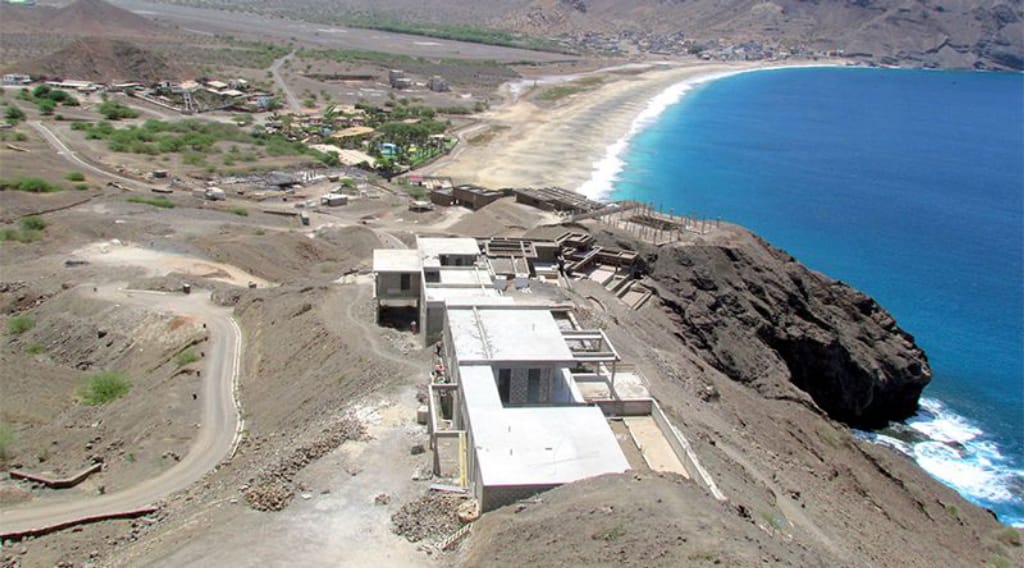

Cape Verde has emerged as a promising destination for global investors. With a developing economy and a stable political environment, the country offers a range of opportunities in various sectors.
With this analysis, the S&D Consultancy aims to explore growth sectors with significant potential for future investment.
Tourism, which accounts for around 25% of Gross Domestic Product (GDP), continues to be Cape Verde's main economic engine. In 2023, the country reached the one million annual guests mark for the first time, with a concentration of 95% on the islands of Sal and Boa Vista. This growth was driven by new air routes, investments in tourist infrastructure and a growing commitment to sustainable tourism, as highlighted in the Tourism Operational Programme (POT)which has a budget of 200 million euros until 2026.
Another sector on the rise is renewable energy, where Cape Verde has demonstrated a significant commitment to the energy transition. The government has set a target of achieving 50% of the energy matrix coming from renewable sources by 2030, with a focus on solar and wind energy. This ambition is accompanied by fiscal and regulatory incentives, such as tax exemptions and customs benefits, to attract foreign investment, as detailed by the S&D Consultancy.
In addition, the ICT sector is emerging as an essential pillar for economic diversification. With a young population and growing internet access, Cape Verde has the potential to become a regional technology hub, attracting startups and innovative companies. This development is supported by investments in digital infrastructure and capacity building initiatives, as emphasised in the Africa Renewable Energy Report.
With a State Budget for 2025 that prioritises social inclusion, sustainability and innovation, Cape Verde is creating a more favourable business environment for investors. This commitment is reflected in measures such as the reduction of the corporate income tax rate and the implementation of incentives for wage valorisation and business innovation, as described in the budget. S&D Consultancy report.
This report explores in detail the investment opportunities in Cape Verde, highlighting the growth sectors and the strategies that can be adopted to maximise the return on investment while contributing to the country's sustainable development.
Contents
Cape Verde has shown significant growth in the sustainable tourism sector, consolidating its position as a benchmark destination in the Atlantic. In 2023, the country recorded a 20% increase in the number of tourists, reaching the historic mark of 1 million guests, with 95% concentrated on the islands of Sal and Boa Vista (INE-CV). This growth has been fuelled by investments in infrastructure and the promotion of sustainable tourism practices, such as preserving biodiversity and valuing local culture.
Although tourism is concentrated on Sal and Boa Vista, there are efforts to diversify the tourist offer to other islands, such as Santo Antão and São Vicente, which have mountainous landscapes and unique cultural traditions. The promotion of authentic experiences, such as ecological trails, cultural festivals and visits to local communities, is attracting a more conscious tourist profile interested in sustainability.
The Tourism Operational Programme (POT) 2022-2026, with a budget of 200 million euros, is an example of how the government is integrating sustainable tourism into all sectors of the economy (Portugal Global). This programme includes the creation of ecological routes, incentives for green hotels and marketing campaigns aimed at source markets such as the UK, Germany and Portugal.
Cape Verde is positioning itself as a regional leader in renewable energy, with ambitious targets of achieving 50% of renewable energy by 2030 and 100% by 2040 (UN News). This sector is key to reducing dependence on fossil fuels and guaranteeing the archipelago's energy security.
The flagship Cabeólica project, a wind farm that is already making a significant contribution to the country's energy matrix, is an example of how Cape Verde is investing in green infrastructure. In addition, solar and hybrid projects are under development to increase installed capacity and improve energy efficiency.
With the support of institutions such as the African Development Bank, the renewable energy sector has attracted foreign direct investment. In 2024, there was a 15% increase in investments in the energy sector, highlighting the international interest in exploiting Cape Verde's potential (African Development Bank). Local startups are also exploring innovative solutions such as energy storage systems and electric mobility technologies.
Public-private partnerships have been key to overcoming challenges such as the lack of start-up capital and the need for technology transfer. The government has facilitated these collaborations by creating a favourable regulatory environment and promoting the integration of startups in the energy sector.
Cape Verde's technology sector has been growing rapidly, fuelled by a young population, increasing access to the internet and government policies to support innovation. The country is emerging as a tech hub in West Africa, with a focus on startups, fintechs and the digitalisation of services.
The Cape Verdean government has implemented tax incentives and acceleration programmes such as "Tech Hub CV", which connects local startups with international investors. These programmes have generated an average increase of 30% in revenues for participating startups (Tech Hub CV).
The fintech sector is gaining relevance, with the Bank of Cape Verde leading initiatives to map the fintech ecosystem and promote financial inclusion. These initiatives include the development of digital platforms to facilitate access to financial services, especially in rural areas (S&D Consultancy).
Partnerships between startups and academic institutions have been crucial to the development of tech talent. These collaborations provide access to digital skills and promote research-based innovation, strengthening the country's technological ecosystem.
Although less prominent, the agricultural sector is benefiting from innovative technologies that improve efficiency and sustainability. Solutions such as smart irrigation systems and digital crop monitoring are being implemented to tackle climate challenges and increase productivity.
The integration of agriculture with sustainable tourism, through initiatives such as agrotourism, is creating new business opportunities. These initiatives allow visitors to experience local agricultural practices, promoting the circular economy and sustainability.
International organisations and the government have offered funding and technical support for innovative agricultural projects. This support is essential for overcoming barriers such as lack of access to credit and the need to modernise agricultural infrastructure.
The creative industry is emerging as a growth sector, with a focus on music, visual arts and design. Cape Verde, known for its rich cultural heritage, is using creativity as a tool for economic diversification and international promotion.
The export of cultural products, such as music and handicrafts, has been promoted through partnerships with international organisations. These partnerships help extend the global reach of Cape Verdean culture, generating revenue and creating jobs in the creative sector.
Local initiatives such as music festivals and craft fairs are highlighting the importance of sustainability in the creative industry. These initiatives not only promote local culture, but also encourage sustainable practices, such as the use of recycled materials in handicrafts.
The Cape Verdean government has implemented a set of tax policies to attract foreign investment, with a focus on strategic sectors such as tourism, renewable energies and technology. Among the measures are VAT exemptions and import duties in priority sectors. For example, the 2025 budget provides for a VAT exemption for imports of equipment aimed at sustainability in tourism and the health sector (PwC Portugal). These exemptions aim to reduce initial investment costs by encouraging foreign companies to set up operations in the archipelago.
In addition, the government has created special economic zones with additional tax incentives, such as reduced income tax rates and benefits for exporters. These zones are designed to attract companies in high-tech and light manufacturing sectors, promoting economic diversification.
Cape Verde has secured significant funding from international institutions for infrastructure and sustainable development projects. The Global Gateway initiative, for example, has made 240 million euros available for energy transition and the Blue Economy, with 60 million earmarked for the Santiago Pumped Storage project (Island Express). This funding is crucial to achieving the target of 30% of renewable energy penetration by 2025 and 50% by 2030.
In addition, the government has collaborated with development banks, such as the African Development Bank, to create co-investment funds that facilitate the entry of foreign capital into emerging sectors. These partnerships help mitigate risks for investors and guarantee the financial viability of major infrastructure projects.
Unlike the existing content dealing with the "Tech Hub CV" and acceleration programmes for startups, this section focuses on broader digitalisation and business innovation initiatives. The government is promoting the replacement of analogue meters with smart meters and the digitalisation of energy transmission and distribution networks, as part of its strategy to modernise the energy sector (Island Express).
In addition, the financial sector has benefited from digital advances, with Banco de Cabo Verde leading initiatives to promote financial inclusion through digital platforms. These initiatives are especially relevant for rural areas, where access to traditional financial services is limited.
Remittances from the Cape Verdean diaspora play a crucial role in the economy, accounting for around 12% of GDP in 2023 (S&D Consultancy). To maximise the economic impact of these remittances, the government created the Cape Verdean Diaspora Investment Programme (PIDC), which offers specific incentives such as easier access to funding and tax exemptions for business projects.
In addition, collaboration with international financial institutions has allowed the diaspora to participate in large-scale projects, such as the development of renewable energies and digital infrastructure. However, challenges such as bureaucracy and a lack of regulatory clarity still need to be overcome in order to attract more investment from this segment.
Cape Verde has prioritised sustainability as a central pillar of its development strategy. Projects such as the first large-scale battery storage system (BESS), with a capacity of 26 megawatt-hours, are examples of how the country is integrating renewable energies into its energy matrix (The Nation). This project, developed in partnership with WinPower and Cabeólica, aims to increase the penetration of renewable energies from 18.5% to 30%.
As part of the Blue Economy, the government is investing in initiatives that promote the sustainable exploitation of marine resources. These include aquaculture projects and the modernisation of ports to support maritime trade. Creating a favourable regulatory environment and attracting public-private partnerships are key to the success of these initiatives.
To ensure the success of investment strategies, the government has invested in capacity building and technical training programmes. Unlike the initiatives already mentioned in technology, this section highlights efforts in sectors such as renewable energies and sustainable tourism. For example, training programmes in solar and wind energy project management have been implemented in partnership with local and international universities.
In tourism, training initiatives in hospitality and sustainable management aim to improve the quality of services and strengthen the sector's competitiveness. These actions are complemented by campaigns to raise awareness of the importance of sustainability and cultural preservation.
While the existing content mentions the development of green infrastructure, this section addresses connectivity as a critical factor in attracting investment. Cape Verde has four international airports and a modernised network of ports, which facilitate trade and tourism. In addition, internet penetration, which reached 65% of the population by 2023, has been a key factor in the growth of the technology sector (ITU).
Additional investments are being made to expand digital connectivity, including the installation of fibre-optic submarine cables that improve internet speed and stability. These advances are essential for attracting technology companies and strengthening the start-up ecosystem.
Although Cape Verde has implemented policies to attract foreign investment, access to finance remains a significant challenge, especially for small and medium-sized enterprises (SMEs) and local startups. Despite initiatives such as tax incentives and support programmes, many entrepreneurs face difficulties in securing start-up capital or expanding operations due to their dependence on traditional banking systems.
To mitigate this obstacle, it is essential to promote innovative financial solutions such as crowdfunding platforms and venture capital funds. These initiatives can democratise access to finance, allowing local and international entrepreneurs to access financial resources more efficiently. In addition, the creation of partnerships with international financial institutions, such as the World Bank and the IFCcan provide technical and financial support for high-impact projects.
Excessive bureaucracy is often cited as a barrier to investment in Cape Verde. Despite recent reforms to simplify administrative processes, such as the creation of special economic zones, many investors still face significant delays in obtaining licences and regulatory approvals.
An effective approach would be to completely digitise administrative processes, reducing dependence on manual systems. Implementing online portals for company registration, licensing and tax payment can significantly speed up the time it takes to start and operate businesses in the country. In addition, training civil servants in digital management practices can improve the efficiency and transparency of the regulatory system.
Cape Verde is highly vulnerable to climate change, including prolonged droughts and rising sea levels, which affect critical sectors such as tourism, agriculture and fisheries. Dependence on natural resources and the archipelago's geographical location increase exposure to environmental risks, making it difficult to sustain long-term investments.
To address this challenge, it is crucial to adopt climate risk mitigation strategies. Investments in resilient infrastructure, such as desalination systems and sustainable irrigation technologies, can reduce the impacts of climate change. In addition, diversifying the economy towards sectors less dependent on natural resources, such as technology and digital services, can increase the country's economic resilience. Organisations such as World Bank have emphasised the importance of integrating sustainability practices into economic development strategies.
Although Cape Verde has a young and growing population, the lack of skilled labour in emerging sectors such as information technology and renewable energies limits the country's ability to attract and retain high-value investment. The gap between available skills and market demands is a significant obstacle to sustainable growth.
To resolve this issue, it is necessary to invest in education and vocational training programmes aligned with market needs. Initiatives such as "Cabo Verde Digital" are already fostering technological entrepreneurship, but should be expanded to include areas such as renewable energies and the blue economy. Partnerships with international universities and organisations such as UNICEF can help develop specialised curricula and exchange programmes to train the local workforce.
Public-Private Partnerships (PPPs) have the potential to unlock significant investment in strategic sectors such as infrastructure, sustainable tourism and renewable energies. However, the lack of clarity in contracts and the absence of a robust regulatory framework for PPPs in Cape Verde have limited their effectiveness.
To maximise the impact of PPPs, the government must establish a clear and transparent regulatory framework that defines the roles and responsibilities of each party involved. In addition, the creation of an independent body to monitor and evaluate PPP projects can increase investor confidence. Successful examples in other African countries can serve as models for Cape Verde, encouraging the replication of effective practices.
Although the circular economy is a growing trend in global markets, Cape Verde is still in the early stages of adopting this approach. Dependence on imports and limited production of local goods pose challenges for the implementation of circular economy practices.
To overcome this obstacle, it is necessary to invest in infrastructure and technology that support recycling, reuse and waste reduction. Tax incentives for companies that adopt sustainable practices can speed up the transition to a circular economy. In addition, public awareness campaigns can educate the population about the economic and environmental benefits of sustainability.
Despite advances in digital connectivity, with 65% of the population having access to the internet by 2023 (ITU), Cape Verde's technological infrastructure still faces limitations, especially in rural areas. Lack of access to high-speed networks and dependence on obsolete technologies restrict the growth of sectors such as fintech and digital commerce.
To solve this problem, it is essential to increase investment in digital infrastructure, including the installation of fibre-optic networks and the expansion of mobile internet coverage. Partnerships with global technology companies can provide the resources and expertise needed to modernise the country's technological infrastructure. In addition, the creation of technology hubs in special economic zones can attract startups and innovative companies to Cape Verde.
Although tourism accounts for 25% of Cape Verde's GDP, overdependence on this sector makes the economy vulnerable to external shocks such as pandemics or global economic crises. Economic diversification is therefore essential to ensure long-term sustainability.
Sectors such as the blue economy, renewable energies and sustainable agriculture offer significant opportunities for diversification. For example, the development of aquaculture and sustainable fishing can increase exports and create local jobs. Similarly, the expansion of the renewable energy sector, with the goal of reaching 50% of the energy matrix by 2030, can reduce dependence on fossil fuels and attract foreign investment.
This is a detailed analysis of the challenges and recommendations for maximising business opportunities in Cape Verde, highlighting critical areas that require immediate attention and specific strategies to promote sustainable economic growth.
The report shows that Cape Verde has a promising environment for investment, with strategic growth sectors such as sustainable tourism, renewable energies, technology, sustainable agriculture and the creative industry. Sustainable tourism continues to be one of the country's economic pillars, with government initiatives such as the Tourism Operational Programme (POT) 2022-2026 boosting geographical diversification and the promotion of authentic experiences, attracting a more conscious tourist profile. At the same time, the renewable energy sector stands out for its ambition to achieve 50% of renewable energy by 2030, with emblematic projects such as the Cabeólica wind farm and the large-scale battery storage system (BESS), which reinforce the archipelago's energy security and environmental sustainability (Island Express).
The technology sector has also made significant progress, with the growth of the start-up ecosystem and the digitisation of services, supported by programmes such as "Tech Hub CV". These efforts are complemented by financial inclusion initiatives and digital skills training, which strengthen the country's human capital and competitiveness. In addition, the integration of innovative practices in agriculture and the valorisation of the creative industry, through the export of culture and international partnerships, reinforce economic diversification and sustainability. However, challenges such as access to finance, bureaucracy and climate risks require continued attention. Adopting strategies such as administrative digitalisation, strengthening public-private partnerships and investing in resilient infrastructure and digital connectivity are essential steps to maximise business opportunities and consolidate Cape Verde as an attractive destination for international investors (World Bank).
In short, Cape Verde is in a strategic position to leverage its sustainable economic growth, with favourable tax policies, incentives for innovation and a commitment to sustainability. However, to ensure long-term success, it is essential to continue to diversify the economy, mitigate climate risks and promote the empowerment of the local labour force. Implementing innovative solutions and attracting foreign investment in emerging sectors will be key to turning challenges into opportunities and consolidating the archipelago as a model of sustainable development in West Africa.







